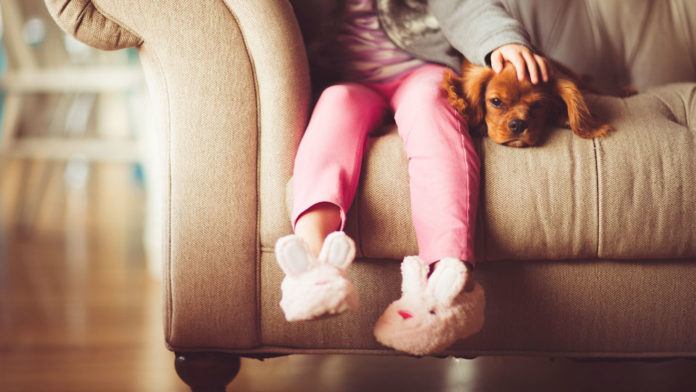Having a pet dog at home can come with lots of benefits for kids, from increasing social development, to decreasing anxiety and stress, to encouraging physical activity. New research from the University of Alberta suggests that children may even see long-term benefits from something that might not seem like a great thing: increased exposure to dirt and bacteria.
Anita Kozyrskyj, an epidemiologist at the University of Alberta, is a leading expert on the gut microbiome: the collection of friendly bacteria and microbes that live in our guts that often help keep us healthy. They help us digest and defend against harmful microbes.
Every person’s gut microbiome is unique, and is largely established early in life by what we’re exposed to, including inside the womb and at birth.
Kozyrskyj and her team analyzed fecal samples from 746 three-month-old infants to try to tease apart whether having a pet affected the gut microbiome. About half of the infants lived with pets at home (70% were dog owners).
The infants who had pets had significantly higher levels of two friendly microbes, Ruminococcus and Oscillospira, with double the count observed in infants without pets. These two microbes are associated with lower risk of allergies and obesity, respectively.
When Kozyrskyj looked at other factors, like whether the infants were formula-fed or born by C-section, both of which can negatively impact the diversity of the gut microbiome, she found that the benefits of pet exposure were still present. Even if the pet was given away before birth, the benefits were still transferred through the womb.
Kozyrskyj is quick to note that an observational study like this does not point to cause and effect, meaning that there could still be other factors at play. For instance, families that are more likely to own dogs may also be more likely to lead active outdoor lifestyles, which could also explain the differences observed.
Either way, the benefits seen may pave the way to supplementing a healthy gut microbiome with microbes associated with pet ownership, in much the same way as probiotics that are currently on the market.
This is just one more reason to smile at the special relationships between kids and their favourite furry friends.








































